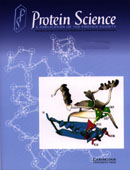Crossref Citations
This article has been cited by the following publications. This list is generated based on data provided by
Crossref.
Liddington, Robert
Frederick, Christin
Clarke, Jane
and
Jackson, Sophie
1999.
Paper Alert.
Structure,
Vol. 7,
Issue. 11,
p.
R269.
Kirshenbaum, Kent
Young, Malin
and
Highsmith, Stefan
1999.
Predicting allosteric switches in myosins.
Protein Science,
Vol. 8,
Issue. 9,
p.
1806.
Zhou, Xianghong
Alber, Frank
Folkers, Gerd
Gonnet, Gaston H.
and
Chelvanayagam, Gareth
2000.
An analysis of the helix-to-strand transition between peptides with identical sequence.
Proteins: Structure, Function, and Genetics,
Vol. 41,
Issue. 2,
p.
248.
Zhao, Hui
Chen, Min‐Hao
Shen, Zheng‐Ming
Kahn, Peter C.
and
Lipke, Peter N.
2001.
Environmentally induced reversible conformational switching in the yeast cell adhesion protein α‐agglutinin.
Protein Science,
Vol. 10,
Issue. 6,
p.
1113.
Rost, Burkhard
2001.
Review: Protein Secondary Structure Prediction Continues to Rise.
Journal of Structural Biology,
Vol. 134,
Issue. 2-3,
p.
204.
Narita, Akihiro
Yasunaga, Takuo
Ishikawa, Takashi
Mayanagi, Kota
and
Wakabayashi, Takeyuki
2001.
Ca2+-induced switching of troponin and tropomyosin on actin filaments as revealed by electron cryo-microscopy1 1Edited by A. Klug.
Journal of Molecular Biology,
Vol. 308,
Issue. 2,
p.
241.
Carugo, Oliviero
2001.
Detection of breaking points in helices linking separate domains.
Proteins: Structure, Function, and Genetics,
Vol. 42,
Issue. 3,
p.
390.
Dunker, A.Keith
Lawson, J.David
Brown, Celeste J
Williams, Ryan M
Romero, Pedro
Oh, Jeong S
Oldfield, Christopher J
Campen, Andrew M
Ratliff, Catherine M
Hipps, Kerry W
Ausio, Juan
Nissen, Mark S
Reeves, Raymond
Kang, ChulHee
Kissinger, Charles R
Bailey, Robert W
Griswold, Michael D
Chiu, Wah
Garner, Ethan C
and
Obradovic, Zoran
2001.
Intrinsically disordered protein.
Journal of Molecular Graphics and Modelling,
Vol. 19,
Issue. 1,
p.
26.
Rost, Burkhard
and
Eyrich, Volker A.
2001.
EVA: Large-scale analysis of secondary structure prediction.
Proteins: Structure, Function, and Genetics,
Vol. 45,
Issue. S5,
p.
192.
Ababou, Abdessamad
and
Desjarlais, John R.
2001.
Solvation energetics and conformational change in EF‐hand proteins.
Protein Science,
Vol. 10,
Issue. 2,
p.
301.
Angermayr, Michaela
and
Bandlow, Wolfhard
2002.
RIO1, an extraordinary novel protein kinase.
FEBS Letters,
Vol. 524,
Issue. 1-3,
p.
31.
Liu, Jinfeng
Tan, Hepan
and
Rost, Burkhard
2002.
Loopy Proteins Appear Conserved in Evolution.
Journal of Molecular Biology,
Vol. 322,
Issue. 1,
p.
53.
Andersen, Claus A.F.
Palmer, Arthur G.
Brunak, Søren
and
Rost, Burkhard
2002.
Continuum Secondary Structure Captures Protein Flexibility.
Structure,
Vol. 10,
Issue. 2,
p.
175.
Krebs, W. G.
Alexandrov, Vadim
Wilson, Cyrus A.
Echols, Nathaniel
Yu, Haiyuan
and
Gerstein, Mark
2002.
Normal mode analysis of macromolecular motions in a database framework: Developing mode concentration as a useful classifying statistic.
Proteins: Structure, Function, and Bioinformatics,
Vol. 48,
Issue. 4,
p.
682.
Pollastri, Gianluca
Przybylski, Darisz
Rost, Burkhard
and
Baldi, Pierre
2002.
Improving the prediction of protein secondary structure in three and eight classes using recurrent neural networks and profiles.
Proteins: Structure, Function, and Bioinformatics,
Vol. 47,
Issue. 2,
p.
228.
Denman, Robert B.
and
Sung, Ying Ju
2002.
Species-Specific and Isoform-Specific RNA Binding of Human and Mouse Fragile X Mental Retardation Proteins.
Biochemical and Biophysical Research Communications,
Vol. 292,
Issue. 4,
p.
1063.
Garcia-Mira, Maria M.
Sadqi, Mourad
Fischer, Niels
Sanchez-Ruiz, Jose M.
and
Muñoz, Victor
2002.
Experimental Identification of Downhill Protein Folding.
Science,
Vol. 298,
Issue. 5601,
p.
2191.
LeVine III, Harry
2003.
Y10W β(1–40) fluorescence reflects epitope exposure in conformers of Alzheimer’s β-peptide.
Archives of Biochemistry and Biophysics,
Vol. 417,
Issue. 1,
p.
112.
Rost, Burkhard
Liu, Jinfeng
Przybylski, Dariusz
Nair, Rajesh
Wrzeszczynski, Kazimierz O.
Bigelow, Henry
and
Ofran, Yanay
2003.
Handbook of Chemoinformatics.
p.
1789.
Krebs, W.G.
Tsai, J.
Alexandrov, Vadim
Junker, Jochen
Jansen, Ronald
and
Gerstein, Mark
2003.
Macromolecular Crystallography, Part D.
Vol. 374,
Issue. ,
p.
544.

